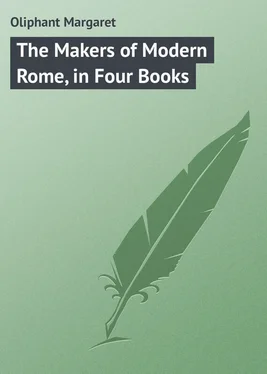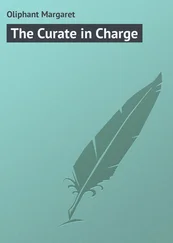Margaret Oliphant - The Makers of Modern Rome, in Four Books
Здесь есть возможность читать онлайн «Margaret Oliphant - The Makers of Modern Rome, in Four Books» — ознакомительный отрывок электронной книги совершенно бесплатно, а после прочтения отрывка купить полную версию. В некоторых случаях можно слушать аудио, скачать через торрент в формате fb2 и присутствует краткое содержание. Жанр: foreign_prose, на английском языке. Описание произведения, (предисловие) а так же отзывы посетителей доступны на портале библиотеки ЛибКат.
- Название:The Makers of Modern Rome, in Four Books
- Автор:
- Жанр:
- Год:неизвестен
- ISBN:нет данных
- Рейтинг книги:5 / 5. Голосов: 1
-
Избранное:Добавить в избранное
- Отзывы:
-
Ваша оценка:
- 100
- 1
- 2
- 3
- 4
- 5
The Makers of Modern Rome, in Four Books: краткое содержание, описание и аннотация
Предлагаем к чтению аннотацию, описание, краткое содержание или предисловие (зависит от того, что написал сам автор книги «The Makers of Modern Rome, in Four Books»). Если вы не нашли необходимую информацию о книге — напишите в комментариях, мы постараемся отыскать её.
The Makers of Modern Rome, in Four Books — читать онлайн ознакомительный отрывок
Ниже представлен текст книги, разбитый по страницам. Система сохранения места последней прочитанной страницы, позволяет с удобством читать онлайн бесплатно книгу «The Makers of Modern Rome, in Four Books», без необходимости каждый раз заново искать на чём Вы остановились. Поставьте закладку, и сможете в любой момент перейти на страницу, на которой закончили чтение.
Интервал:
Закладка:
"Had Paula and Melania rushed to the baths, taken advantage of their wealth and position to join, perfumed and adorned, in one worship God and their wealth, their freedom and pleasure, they would have been known as great and saintly ladies; but now it is said they seek to be admired in sackcloth and ashes, and go down to hell laden with fasting and mortifications: as if they could not as well have been damned along with the rest, amid the applauses of the crowd. If it were Pagans and Jews who condemned them, they would have had the consolation of being hated by those who hated Christ, but these are Christians, or men known by that name.
"Lady Asella, I write these lines in haste, while the ship spreads its sails. I write them with sobs and tears, yet giving thanks to God to have been found worthy of the hatred of the world. Salute Paula and Eustochium, mine in Christ whether the world pleases or not, salute Albina your mother, Marcella your sister, Marcellina, Felicita: say to them that we shall meet again before the judgment seat of God, where the secrets of all hearts shall be revealed. Remember me, oh example of purity! and may thy prayers tranquillise before me the tumults of the sea!"
The agitation with which the community of ladies must have received such a letter may easily be imagined. They were better able than any others to judge of the probity and honour of the writer who had lived among them so long: and no doubt all these storms raging about, the injurious and insulting imputations, all the evil tongues of Rome let loose upon the harmless house, their privacy invaded, their quiet disturbed, must, during the whole course of the deplorable incident, have been the cause of pain and trouble unspeakable to the gentle society on the Aventine. Marcella it is evident had done what she could to stop the mouth of Jerome when the trouble began; it is perhaps for this reason that the letter of farewell is addressed to the older Asella, perhaps a milder judge.
Paula's preparations had begun before Jerome had as yet thought of his more abrupt departure. They were not so easily made as those of a solitary already detached from the world. She had all her family affairs to regulate, and, what was harder still, her children to part with, the most difficult of all, and the special point in her conduct with which it is impossible for us to sympathise. But it must be remembered that Paula, a spotless matron, had been branded with the most shameful of slanders, that she had been shrieked at by the crowd as the slayer of her daughter, and accused by society of having dishonoured her name. She had been the subject of a case of libel, as we should say, before the public courts, and though the slanderer had confessed his falsehood (under the influence of torture it would seem, according to the words of Jerome), the imputation, as in most cases, remained. Outraged and wounded to the quick, it is very possible that she may have thought that it was well for her younger children that she should leave them, that they might not remain under the wing of a mother whose name had been bandied about in the mouths of men. Her daughter Paulina was by this time married to the good and faithful Pammachius, whose protection might be of greater advantage to the younger girl and boy than her own. And Paula had full knowledge of the tender mercies of her pagan relations, and of the influence they were likely to exercise against her, even in her own house. The staid young Eustochium, grave and calm, clung to her mother's side, her youthful head already covered by the veil of the dedicated virgin, a serene and unfaltering figure in the midst of all the agitations of the parting. All Rome poured forth to accompany them to the port, brothers and sisters with their wives and husbands, relations less near, a crowd of friends. All the way along the winding banks of the Tiber they plied Paula with entreaties and reproaches and tears. She made them no reply. She was at all times slow to speak, as the tender chronicle reports. "She raised her eyes to heaven, pious towards her children but more pious to God." She retained her self-command until the vessel began to move from the shore, where little Toxotius, the boy of ten years old, stood stretching out his hands to her in a last appeal, his sister Rufina silent, with wistful eyes, by his side. Paula's heart was like to burst. She turned her eyes away unable to bear that cruel sight, while Eustochium, firm and steadfast, supported her weaker mother in her arms.
Was it a cruel desertion, a heartless abandonment of duty? Who can tell? There are desertions, cruelties in this kind, which are the highest sacrifice, and sometimes the most bitter proof of self-devotion. Did Paula in her heart believe, most painful thought that can enter a mother's mind, that her boy would be better without her, brought up in peace among his uncles and guardians, who, had she been there, would have made his life a continual struggle between two sides? Was Rufina more likely to be happy in her gentle sister's charge, than with her mind disturbed, and perhaps her marriage spoiled, by her mother's religious vows, and all that was involved in them? She might be wrong in thinking so, as we are all wrong often in our best and most painfully pondered plans. But condemnation is very easy, and gives so little trouble – there is surely a word to be said on the other side of the question.
When these pilgrims leave Rome they cease to have any part in the story of the great city with which we have to do. Yet their after-fate may be stated in a few words. No need to follow the great lady in her journey over land and sea to the Holy Land with all its associations, where Jerusalem out of her ruins, decked with a new classic name, was already rising again into the knowledge and the veneration of the world. These were not the days of excursion trains and steamers, it is true; but the number of pilgrims ever coming and going to those more than classic shores, those holy places, animated with every higher hope, was perhaps greater in proportion to the smaller size and less population of the known world than are our many pilgrimages now, though this seems so strange a thing to say. But is there not a Murray, a Baedeker, of the fourth century, still existent, the Itinéraire de Bordeaux à Jerusalem , unquestioned and authentic, containing the most careful account of inns and places of refuge and modes of travel for the pilgrims? It is possible that the lady Paula may have had that ancient roll in her satchel, or slung about the shoulders of her attendant for constant reference. Her ship was occupied by her own party alone, and conveyed, no doubt, much baggage and many provisions as an emigration for life would naturally do; and it was hindered by no storms, as far as we hear, but only by a great calm which delayed the vessel much and made the voyage tedious, necessitating the use of the galley's oars, which very likely the ladies would like best, though it kept them so many more days upon the sea. They reached Cyprus at last, that holy island now covered with monasteries, where Epiphanius, once Paula's guest in Rome, awaited and received her with every honour, and where there were many visits to be paid to monks and nuns in their new establishments, the favourite dissipation of the cloister. The ladies afterwards continued their voyage to Antioch, where they met Jerome; and proceeded on their journey, having probably had enough of the sea, along the coast by Tyre and Sidon, by Herod's splendid city of Cæsarea, and Joppa with its memories of the Apostles – not without a thought of Andromeda and her monster as they looked over the dark and dangerous reefs which still scare the traveller: for they loved literature, notwithstanding their separation from the world. They formed by this time a great caravanserai, not unlike, to tell the truth, one of those parties which we are so apt to despise, under charge of guides and attendants who wear the livery of Cook. But such an expedition was far more dignified and important in those distant days. Jerome and his monks made but one family of sisters and brothers with the Roman ladies and their followers, who endured so bravely all the fatigues and dangers of the way. Paula the pilgrim was no longer a tottering fine lady, but the most animated and interested of travellers, with no mere mission of hermit-hunting like Melania, but the truest human enthusiasm for all the storied scenes through which she passed. When they reached Jerusalem she went in a rapture of tears and exaltation from one to another of the sacred sites, kissing the broken stone which was supposed to have been that which was rolled against the door of the Holy Sepulchre, and following with pious awe and joy the steps of Helena into the cave where the True Cross was found. The legend was still fresh in those days, and doubts there were none. The enthusiasm of Paula, the rapture and exaltation, which found vent in torrents of tears, in ecstasies of sacred emotion, joy and prayer, moved all the city, thronged with pilgrims, devout and otherwise, to whom the great Roman lady was a wonder: the crowd followed her about from point to point, marvelling at her devotion and the warmth of natural feeling which in all circumstances distinguished her. The reader cannot but follow still with admiring interest a figure so fresh, so unconventional, so profoundly touched by all those holy and sacred associations. Amid so many who are represented as almost more abstracted among spiritual thoughts than nature permits, her frank emotion and tender, natural enthusiasm are always a refreshment and a charm.
Читать дальшеИнтервал:
Закладка:
Похожие книги на «The Makers of Modern Rome, in Four Books»
Представляем Вашему вниманию похожие книги на «The Makers of Modern Rome, in Four Books» списком для выбора. Мы отобрали схожую по названию и смыслу литературу в надежде предоставить читателям больше вариантов отыскать новые, интересные, ещё непрочитанные произведения.
Обсуждение, отзывы о книге «The Makers of Modern Rome, in Four Books» и просто собственные мнения читателей. Оставьте ваши комментарии, напишите, что Вы думаете о произведении, его смысле или главных героях. Укажите что конкретно понравилось, а что нет, и почему Вы так считаете.












